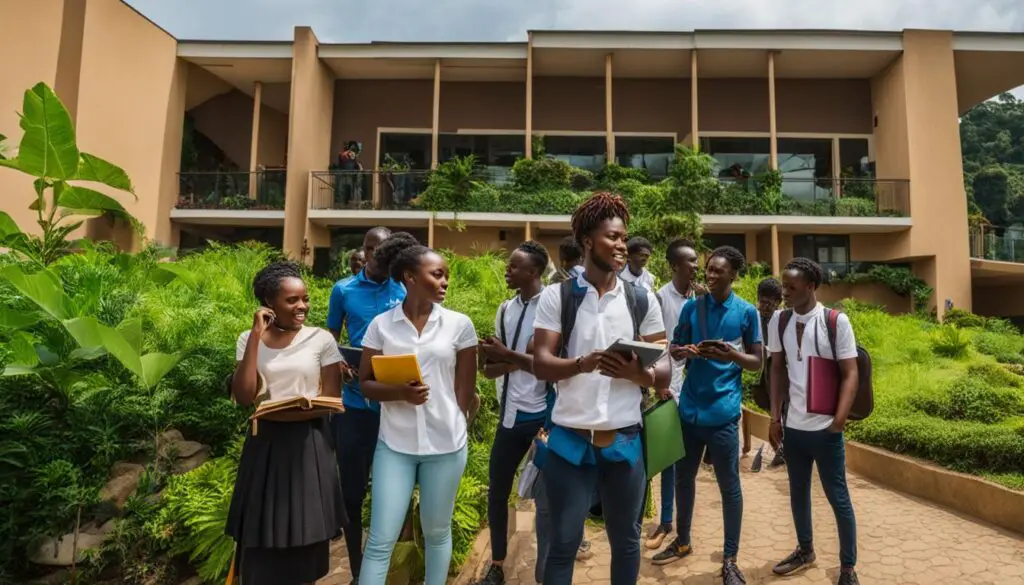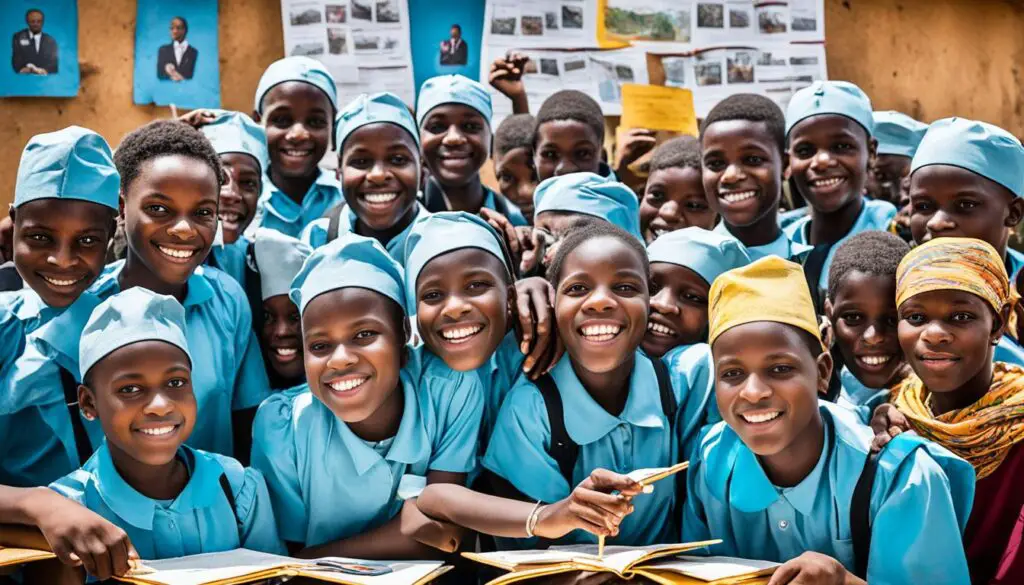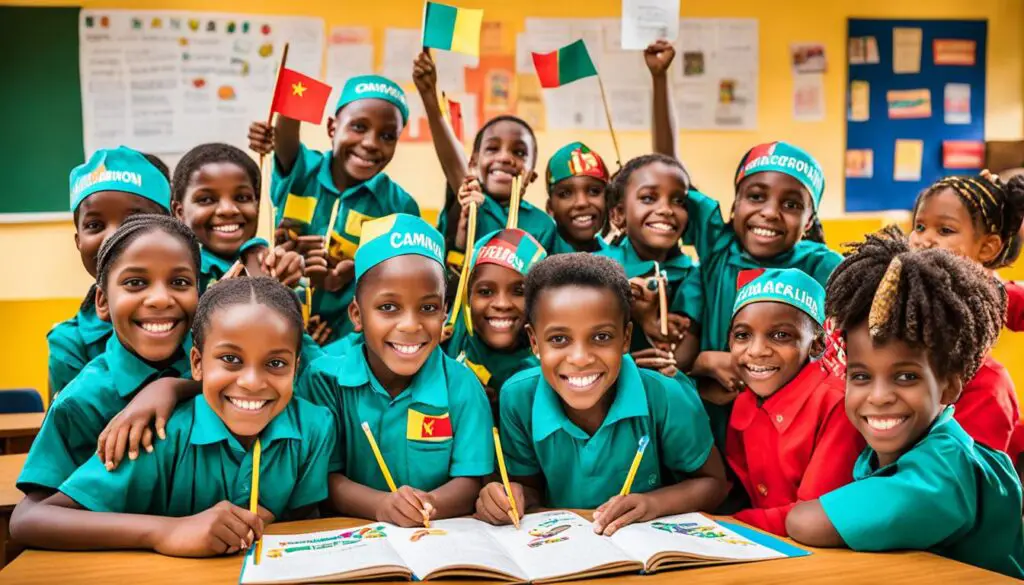Welcome to our comprehensive guide to the Cameroon education system. In this article, we will delve into the structure, nuances, and unique facets of education in Cameroon. Whether you are a student, parent, or education enthusiast, this article will provide you with valuable insights into the educational landscape of Cameroon.
Education in Cameroon encompasses a diverse range of educational levels, from primary education to secondary education and higher education. Each level has its own distinctive features, curriculum, and opportunities for students to excel.
We will explore the structure of primary education, including the primary school system, curriculum, and the process of student enrollment. Additionally, we will delve into secondary education, examining secondary schools, national examinations, and vocational training options available to students.
Furthermore, we will shed light on the higher education opportunities in Cameroon, such as universities, colleges, and professional training institutes, enabling students to pursue various academic and career paths.
As we navigate through the intricacies of the Cameroon education system, we will also uncover the challenges it faces and the ongoing reforms aimed at improving access and quality of education. We will discuss the significance of bilingual education, technical and vocational education training programs, and the provision of special education for students with diverse needs.
In addition, we will highlight the vital role of parents and the community in supporting education, emphasizing their involvement and engagement in creating an enriching learning environment for students.
Lastly, we will explore noteworthy education initiatives and achievements in Cameroon, such as literacy campaigns, initiatives promoting girls’ education, and efforts to enhance access to education in remote areas.
Join us on this educational journey, as we unravel the intricacies of the Cameroon education system and strive towards ensuring quality education for all.
Key Takeaways:
- The Cameroon education system encompasses primary, secondary, and higher education levels.
- Primary education in Cameroon follows a structured curriculum and enrollment process.
- Secondary education in Cameroon includes national examinations and vocational training options.
- Higher education opportunities in Cameroon include universities, colleges, and professional training institutes.
- The Cameroon education system faces challenges and ongoing reforms to improve access and quality of education.
Education Levels in Cameroon
Education in Cameroon encompasses different levels, from primary education to secondary education and higher education. Understanding the distinct characteristics of each level is essential for a comprehensive understanding of the country’s education system.
Primary Education: Primary education serves as the foundation for a child’s academic journey. It typically spans from the ages of 6 to 11, and its primary focus is to provide students with basic literacy and numeracy skills. During this stage, children learn subjects such as mathematics, languages (including English and French), social sciences, and natural sciences.
Secondary Education: After completing primary education, students move on to secondary education in Cameroon. This stage generally lasts for six years, from the ages of 12 to 18. Secondary education is divided into two cycles: the lower cycle (form 1 to form 3) and the upper cycle (form 4 to form 6). Students explore a wider range of subjects, including humanities, sciences, and vocational courses.
Higher Education: Higher education in Cameroon encompasses universities, colleges, and professional training institutes. It provides students with the opportunity to pursue specialized knowledge and skills in various fields, including medicine, engineering, social sciences, and business. Higher education plays a vital role in preparing individuals for the workforce and fostering intellectual and personal development.

Structure of Primary Education
Primary education in Cameroon provides the foundation for a child’s academic journey. Let’s explore the structure of primary education, including the primary school system, curriculum, and student enrollment process.
Primary schools in Cameroon play a crucial role in shaping young minds and fostering a love for learning. They cater to students aged 6 to 11, typically covering the first six years of formal education.
The primary school curriculum in Cameroon is designed to provide a well-rounded education that encompasses various subjects such as mathematics, language arts, science, social studies, and physical education. This comprehensive curriculum ensures students develop a broad knowledge base across multiple disciplines.
Enrollment in primary schools is a significant milestone for children in Cameroon. Parents or legal guardians typically complete the enrollment process by submitting required documents, such as birth certificates and immunization records, to the school administration. It’s important to ensure proper enrollment to secure a child’s access to primary education.
Primary education sets the stage for a child’s educational journey, laying the groundwork for future academic success. By providing a solid educational foundation, primary schools in Cameroon contribute to the overall development and well-being of students.
Stay tuned for the next section where we delve into secondary education in Cameroon, exploring secondary schools, national examinations, and vocational training options.
Secondary Education in Cameroon
Secondary education in Cameroon plays a crucial role in preparing students for their future endeavors. It builds on the foundation laid during primary education, providing students with a wide range of academic and vocational opportunities.
At this level, students attend secondary schools where they deepen their knowledge in various subjects and develop critical thinking and problem-solving skills. The curriculum is designed to equip students with a well-rounded education, laying the groundwork for their chosen career paths.
One significant aspect of secondary education in Cameroon is the emphasis on national examinations. These examinations, such as the General Certificate of Education Ordinary Level (GCE O-level) and the General Certificate of Education Advanced Level (GCE A-level), are crucial for assessing students’ academic achievements and determining their eligibility for higher education institutions.
Vocational training is also an integral part of secondary education in Cameroon. Recognizing the importance of practical skills in the job market, vocational programs are offered to students who prefer a more hands-on approach to learning. These programs provide training in fields such as agriculture, carpentry, plumbing, and electrical work, among others.
The vocational training options available in secondary schools empower students to pursue careers in technical fields and contribute to the economic development of the country. By offering a combination of academic and vocational pathways, the secondary education system in Cameroon caters to the diverse interests and aspirations of students.

Preparing Students for a Bright Future
In conclusion, secondary education in Cameroon plays a vital role in shaping the future of students. It provides them with the knowledge, skills, and qualifications needed to succeed, whether they choose to further their studies at universities or colleges, or enter the workforce directly after graduation. The inclusive nature of the secondary education system, with both academic and vocational training options, ensures that students are well-prepared to contribute to the society and economy of Cameroon.
Higher Education Opportunities
As you progress through the education system in Cameroon, you’ll have access to a wide range of higher education opportunities. Whether you’re interested in pursuing a degree at a university, gaining practical skills at a college, or seeking professional training in a specialized field, Cameroon offers various options to meet your educational goals.
Universities:
Cameroon boasts several reputable universities that provide comprehensive academic programs across various disciplines. These universities offer bachelor’s, master’s, and doctoral degree programs, allowing students to delve deeper into their chosen fields of study.
Colleges:
Colleges in Cameroon focus on practical education, equipping students with the skills and knowledge needed for specific professions. These institutions offer programs that cover a wide range of vocational subjects, including business, healthcare, engineering, and more.
Professional Training Institutes:
In addition to universities and colleges, Cameroon also has professional training institutes that specialize in specific industries or professions. These institutes provide intensive training programs designed to equip students with the practical skills required for their chosen careers, preparing them for immediate entry into the workforce.
Whether you’re interested in pursuing an academic degree, gaining practical skills, or seeking specialized professional training, the higher education opportunities in Cameroon cater to a diverse range of educational and career aspirations.

Continued Growth and Expansion
The higher education sector in Cameroon is experiencing continued growth and expansion. With advancements in technology and an increasing demand for skilled professionals, universities, colleges, and professional training institutes are continuously striving to enhance their programs and offerings. This ensures that students have access to relevant and up-to-date education that prepares them for the evolving job market.
Through these higher education opportunities, individuals in Cameroon can acquire the knowledge, skills, and qualifications necessary to thrive in their chosen fields and contribute to the social and economic development of the country.
Challenges and Reforms in the Education System
In order to provide quality education for all, the Cameroon education system faces various challenges that require ongoing reforms. Two crucial areas of focus are improving access to education and enhancing the quality of the learning experience.
One of the key challenges is ensuring equal access to education for all children, regardless of their geographical location or socio-economic background. Many remote areas in Cameroon still lack adequate educational infrastructure and resources, making it difficult for children in these regions to receive a quality education. Initiatives are being implemented to build schools, improve transportation networks, and develop educational programs tailored to the specific needs of these communities, thus increasing access to education.
The quality of education is also a significant concern. While progress has been made, there is still room for improvement in terms of curriculum relevance, teaching methods, and teacher training. Educational reforms are being introduced to enhance the quality of instruction, integrate modern teaching techniques, and promote critical thinking and problem-solving skills among students.
Educational reforms in Cameroon are focused on creating a more inclusive and student-centered learning environment. This involves developing and implementing policies that cater to diverse learning needs, fostering a supportive and inclusive school culture, and providing adequate resources and support services for students with special needs.
To address these challenges and drive positive change, collaboration among various stakeholders, including government agencies, educators, parents, and local communities, is crucial. By working together and implementing effective reform strategies, the Cameroon education system can make significant progress towards providing inclusive, high-quality education for all children.

Bilingual Education in Cameroon
In Cameroon, bilingual education plays a significant role in shaping the educational landscape. With English and French being the official languages of the country, bilingualism is deeply ingrained in the educational system. This unique aspect allows students to develop proficiency in both languages, opening up a world of opportunities.
One of the primary advantages of bilingual education is the ability for students to communicate effectively in both English and French, enhancing their language skills and facilitating cultural exchange. Fluency in these languages provides students with a competitive edge in an increasingly globalized world.

Bilingual schools in Cameroon are specifically designed to provide students with instruction in both English and French languages. These schools offer a diverse curriculum that encompasses subjects taught in both languages, fostering a well-rounded education and cross-cultural understanding.
By immersing students in a bilingual environment from an early age, bilingual schools in Cameroon nurture language development and promote cultural diversity. This approach not only enhances linguistic abilities but also promotes a deeper appreciation for different cultures and perspectives.
The Benefits of Bilingual Education
Bilingual education in Cameroon brings numerous benefits to students. Firstly, it enhances cognitive abilities, such as critical thinking and problem-solving skills, as it requires students to engage with and process information in two different languages. This cognitive flexibility extends beyond language learning and positively impacts academic performance overall.
Furthermore, bilingual education equips students with valuable skills that are highly sought after in the job market. In today’s global economy, proficiency in multiple languages opens up a wide range of career opportunities, both locally and internationally.
Moreover, bilingual education promotes cultural understanding and social integration. By learning and interacting in two languages, students develop a broader worldview and are better equipped to communicate and collaborate with individuals from diverse backgrounds.
In conclusion, bilingual education in Cameroon plays a crucial role in fostering language skills, cultural appreciation, cognitive abilities, and preparing students for the global workforce. The commitment to bilingual education reflects Cameroon’s dedication to providing a well-rounded education that embraces linguistic diversity and prepares students for success in an interconnected world.
Technical and Vocational Education Training (TVET)
Technical and Vocational Education Training (TVET) programs play a crucial role in equipping students with practical skills that are highly valued in the job market. These programs focus on skills development and provide vocational training in various fields, ensuring that students are equipped with the necessary expertise to thrive in their chosen careers.
TVET programs offer a wide range of vocational programs that cater to diverse interests and industries. From automotive repair to culinary arts, healthcare to information technology, these programs provide specialized training that prepares students for specific professions.
The Importance of Skills Development
One of the key benefits of TVET programs is their emphasis on skills development. Unlike traditional academic education, TVET programs prioritize hands-on experience and practical training. Students gain valuable skills that directly translate into the workplace, making them highly employable upon graduation.
These programs focus on teaching industry-specific skills, giving students a competitive edge in the job market. Whether it’s acquiring technical expertise, mastering trade skills, or developing problem-solving abilities, TVET programs are designed to ensure students are well-prepared to meet the demands of various industries.
Meeting the Demands of the Job Market
In today’s evolving job market, the demand for skilled workers is consistently growing. Employers are seeking candidates with hands-on experience and specialized knowledge in their respective fields. TVET programs bridge the gap between education and employment by providing students with directly applicable skills.
By aligning vocational training with the needs of the job market, TVET programs ensure that graduates are equipped with the skills and knowledge that employers are actively seeking. This not only enhances employability but also contributes to the overall economic growth of the country.
Furthermore, TVET programs offer opportunities for career advancement and professional growth. As industries evolve, these programs provide avenues for individuals to upskill and stay relevant in a rapidly changing job market. They support lifelong learning and enable individuals to adapt to emerging technological advancements and industry trends.
Overall, TVET programs play a vital role in preparing individuals for successful careers and meeting the demands of the job market. Their emphasis on skills development and vocational training equips students with practical expertise, making them highly sought after by employers across various industries.
Special Education in Cameroon
Special education plays a crucial role in promoting inclusive education and providing support to students with special needs in Cameroon. The government and educational institutions in Cameroon are dedicated to ensuring that every child has access to quality education, regardless of their abilities or disabilities.
Inclusive education is a cornerstone of special education in Cameroon. Inclusive education aims to provide students with disabilities the opportunity to learn alongside their peers in regular classrooms, fostering a sense of belonging and promoting social integration. By embracing inclusive education, Cameroon is working towards creating an inclusive society that values and supports the diversity of all individuals.
The provision of support services is another essential aspect of special education in Cameroon. These support services are designed to address the unique needs of students with disabilities, ensuring they receive the necessary accommodations and assistance to succeed academically and socially. Support services may include individualized education plans (IEPs), assistive technologies, specialized teaching methods, and additional support from teachers, learning support assistants, and therapists.
Cameroon also recognizes the importance of providing resources to support students with special needs. These resources can include specialized learning materials, accessible facilities, and trained professionals who can provide guidance and expertise in accommodating different learning styles and abilities. By investing in these resources, Cameroon is actively working towards creating an inclusive and supportive educational environment for all students.
Image: Inclusive Education in Action in Cameroon
The image above showcases inclusive education in action in Cameroon, where students with diverse abilities and disabilities are learning and thriving together. It exemplifies the commitment of Cameroon’s education system to provide equal opportunities for all students, regardless of their special needs.
By prioritizing inclusive education, providing comprehensive support services, and allocating resources for students with special needs, Cameroon is making significant strides towards promoting equal access to education and empowering every student to reach their full potential.
The Role of Parents and Community in Education
Parental involvement, community engagement, and education partnerships play a vital role in the success of the Cameroon education system. When parents actively participate in their children’s education, it enhances academic performance, boosts self-confidence, and fosters a love for learning.
Parents can support their children’s education by creating a conducive learning environment at home, assisting with homework, and engaging in regular communication with teachers. By working hand in hand with educators, parents contribute to improved academic outcomes and overall student well-being.
Community engagement is another crucial aspect of the education system in Cameroon. Strong collaboration between schools and the local community generates a supportive and nurturing environment for students. Community members can participate by volunteering, organizing educational events, and providing mentorship opportunities.
Furthermore, education partnerships between schools and various stakeholders, such as businesses, nonprofit organizations, and government agencies, can bring valuable resources and expertise to the forefront. These collaborations help broaden students’ horizons, expose them to real-world experiences, and enhance their overall educational journey.
Why Parental Involvement Matters
Research consistently shows that parental involvement positively impacts student achievement. When parents take an active interest in their children’s education, students are more likely to excel academically, have higher motivation, and develop essential life skills. Additionally, parental involvement fosters a sense of belonging and support, which contributes to a positive school climate.
Building Strong Education Partnerships
Education partnerships bring together diverse perspectives and resources to enrich the learning experience. By collaborating with local businesses, educational institutions, and community organizations, schools can offer a broader range of opportunities to students.
These partnerships may include internships, guest speakers, mentorship programs, and career guidance initiatives. Through these experiences, students develop a deeper understanding of different professions, gain practical skills, and explore potential career paths.
By embracing the importance of parental involvement, community engagement, and education partnerships, the Cameroon education system can foster a collaborative and supportive ecosystem that empowers students to reach their full potential.
Education Initiatives and Achievements
In Cameroon, several education initiatives have been implemented to promote literacy, girls’ education, and improve access to education, especially in remote areas. These efforts aim to bridge the educational gap and ensure that every child has the opportunity to learn and thrive.
Literacy Campaigns
Literacy campaigns play a crucial role in enhancing literacy rates among both children and adults. These campaigns focus on building basic reading and writing skills, empowering individuals to participate fully in society. Organizations, government bodies, and NGOs collaborate to organize workshops, distribute educational materials, and train teachers to improve literacy levels throughout the country.
Promoting Girls’ Education
Recognizing the importance of girls’ education, Cameroon has made significant strides in promoting gender equality and encouraging girls’ enrollment in schools. Initiatives targeting girls’ education address barriers such as cultural norms, early marriage, and lack of access. By providing scholarships, creating safe learning environments, and raising awareness about the benefits of education, these initiatives empower girls to pursue their dreams and contribute to society.
Improving Access to Education in Remote Areas
Access to education can be challenging in remote areas due to geographical barriers, lack of infrastructure, and limited resources. To address this issue, organizations and government entities are implementing various strategies, such as building schools closer to rural communities, developing mobile education programs, and providing scholarships and transportation assistance. These initiatives aim to ensure that no child is left behind and that education reaches even the most remote corners of the country.
By prioritizing literacy campaigns, promoting girls’ education, and enhancing access to education in remote areas, Cameroon is making significant progress in improving the overall educational landscape. These initiatives not only empower individuals but also contribute to the social and economic development of the nation.
Conclusion
In conclusion, the Cameroon education system is a complex and dynamic framework with unique characteristics. It encompasses various levels of education, including primary, secondary, and higher education, each with its own specific structure and offerings.
Throughout this article, we have explored the nuances of the Cameroon education system, including the bilingual education approach, technical and vocational training programs, and the provision of special education for students with diverse needs.
Furthermore, we have highlighted the challenges and ongoing reforms in the education system, with a focus on improving access to quality education for all. By understanding the intricacies of the Cameroon education system, stakeholders can work together to create initiatives that address these challenges and continue to drive positive change.
FAQ
What is the structure of the Cameroon education system?
The Cameroon education system has a structure that includes primary education, secondary education, and higher education.
What are the levels of education in Cameroon?
The levels of education in Cameroon include primary education, secondary education, and higher education.
How does primary education work in Cameroon?
Primary education in Cameroon consists of primary schools, a curriculum, and a student enrollment process.
What can you tell me about secondary education in Cameroon?
Secondary education in Cameroon encompasses secondary schools, national examinations, and vocational training options.
Are there higher education opportunities in Cameroon?
Yes, Cameroon offers higher education opportunities through universities, colleges, and professional training institutes.
What are the challenges facing the education system in Cameroon?
The education system in Cameroon faces challenges in terms of access and quality, and ongoing reforms aim to address these issues.
Is bilingual education prevalent in Cameroon?
Yes, Cameroon has a unique aspect of bilingual education due to English and French being official languages, along with the presence of bilingual schools.
What is the importance of Technical and Vocational Education Training (TVET) in Cameroon?
TVET programs in Cameroon play a crucial role in developing practical skills for students that are relevant to the job market.
How does Cameroon provide special education?
Cameroon has provisions for special education, including inclusive education approaches and support services for students with special needs.
What is the role of parents and the community in the Cameroon education system?
Parents and the community play a vital role in the Cameroon education system through their involvement, engagement, and educational partnerships.
Can you give examples of education initiatives and achievements in Cameroon?
Cameroon has undertaken various education initiatives, including literacy campaigns, efforts to promote girls’ education, and improving access to education in remote areas.
What can we conclude about the Cameroon education system?
In conclusion, the Cameroon education system is a complex and dynamic framework with unique characteristics. By understanding its structure, nuances, and ongoing reforms, we can work towards ensuring quality education for all in Cameroon.